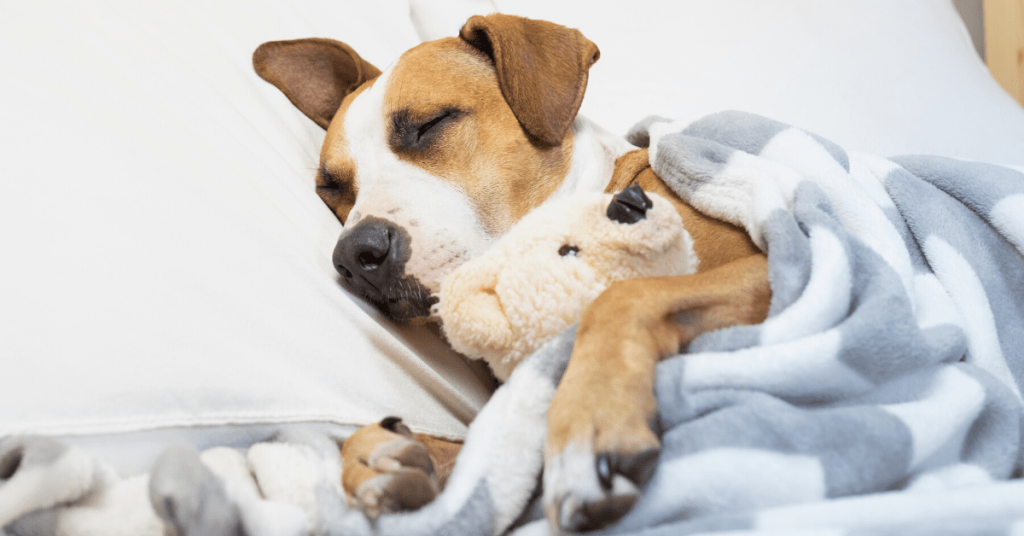Have you ever wondered what the best bedtime is for your furry companion? As dog owners, we want to ensure that our four-legged friends get enough rest to maintain their health and happiness. But when is the optimal time for them to crawl into their cozy beds? Understanding the importance of a good sleep schedule and how it can benefit your canine friend can help you determine the ideal bedtime for your beloved pet.
Factors to Consider
Age of the Dog
When determining the ideal bedtime for your furry friend, one of the first factors to consider is their age. Just like humans, dogs have different sleep needs at different stages of their lives. Puppies, for example, require more sleep than adult dogs due to their rapid growth and development.
Breed
Another important factor to consider is the breed of your dog. Different breeds have different energy levels and sleep patterns. While some breeds are known for being more energetic and may require more physical activity throughout the day, others may be more laid-back and need less exercise. Understanding your dog’s breed characteristics can help you determine their ideal bedtime.
Activity Level
Considering your dog’s activity level is crucial when determining the best time for them to go to bed. If your dog is highly active and engaged in various physical activities during the day, they will likely need more rest and sleep at night to recharge. On the other hand, if your dog has a more sedentary lifestyle, their sleep needs might be slightly different.
Health Conditions
The presence of any health conditions in your dog should also be taken into account when establishing their bedtime routine. Dogs with certain health issues, such as arthritis or chronic pain, may experience discomfort at night, which can affect their sleep quality. Consulting with your veterinarian can provide valuable insights into any specific considerations or modifications that may be necessary to ensure your dog’s comfort and restful sleep.
Owner’s Schedule
Your own schedule plays a role in determining your dog’s bedtime as well. It’s important to establish a routine that aligns with your daily activities and responsibilities. By considering your own bedtime and morning routines, you can find a suitable sleep schedule that allows you to spend quality time with your dog while ensuring they receive the rest they need.
Ideal Bedtime for Puppies
First Few Weeks
During the first few weeks of a puppy’s life, their sleep schedule is largely irregular. They tend to sleep for short periods throughout the day and night, waking up frequently for feeding and bathroom breaks. It’s essential to provide a comfortable and safe sleeping environment for them during this stage, like a warm bed or crate with soft bedding. Gradually, puppies will start to develop a more consolidated sleep pattern.
Two to Three Months Old
By the time they reach two to three months of age, puppies will start to establish a more consistent bedtime routine. They will generally sleep for 15-20 hours a day, with shorter nap periods during the day and longer periods of uninterrupted sleep at night. It is recommended to set their bedtime around 8-10 PM and ensure they have relieved themselves before going to bed.
Three to Four Months Old
As puppies continue to grow and develop, their sleep needs gradually decrease. At three to four months old, they generally require around 14-16 hours of sleep per day. You can adjust their bedtime accordingly, keeping in mind that they may still need to go outside for a toilet break before settling down for the night. It’s advisable to maintain a consistent bedtime routine to help them establish healthy habits.
Four to Six Months Old
At four to six months old, puppies are becoming more independent and their sleep patterns resemble those of adult dogs. They typically need around 12-14 hours of sleep per day, which can be divided into a longer nighttime sleep and a few shorter nap periods during the day. It’s important to ensure they have sufficient exercise and mental stimulation during waking hours to promote good sleep quality.
Ideal Bedtime for Adult Dogs
Young Adults (1-3 years)
As dogs transition into young adulthood, their sleep needs stabilize further. Young adult dogs generally require around 10-12 hours of sleep per day, with a consolidated nighttime sleep and shorter nap periods during the day. Setting a consistent bedtime routine can be beneficial for their overall well-being and energy levels during waking hours.
Adults (4-7 years)
Adult dogs between the ages of four and seven usually need around 10 hours of sleep per day, but individual variations may occur. It’s important to consider your dog’s activity level and breed characteristics when determining their ideal bedtime. Providing them with a comfortable sleeping environment and sticking to a consistent routine can help them settle down and get the rest they need.
Senior Dogs (8+ years)
As dogs enter their senior years, their sleep patterns may change once again. Senior dogs tend to sleep more than their younger counterparts, often requiring around 13-14 hours of sleep per day. However, they may experience difficulties with uninterrupted sleep due to age-related conditions such as arthritis or cognitive decline. It’s crucial to provide them with a cozy and supportive bed and address any discomfort they may be experiencing.
Creating a Bedtime Routine
Consistency
Creating a consistent bedtime routine is essential for dogs of all ages. Consistency helps dogs understand and anticipate their sleep schedule, which can contribute to a more relaxed and restful sleep. Establish a specific time for bedtime and try to adhere to it each night. This routine should include winding down activities and bathroom breaks.
Winding Down
Similar to humans, dogs benefit from winding down activities before bedtime. Engage in calming and low-energy activities with your dog, such as gentle playtime, soothing massages, or quality bonding time. This helps signal to your dog that it’s time to relax and prepare for sleep.
Toilet Breaks
Before settling down for the night, ensure that your dog has had an opportunity to relieve themselves. This can minimize the chances of them needing to wake up in the middle of the night for a bathroom break. Take them outside before bedtime and allow sufficient time for them to do their business.
Comfortable Sleeping Environment
Providing your dog with a comfortable and cozy sleeping environment is crucial for a good night’s rest. Invest in a supportive dog bed or crate with soft bedding that suits your dog’s size and breed. Consider factors such as temperature, lighting, and noise levels in the sleeping area to create an optimal environment for restful sleep.
Bonding Time
Incorporating bonding time into your bedtime routine can deepen the connection between you and your dog while promoting relaxation. This can include gentle stroking, cuddling, or simply spending quiet time together. Bonding time not only helps your dog feel loved and secure but also contributes to a sense of calm before sleep.
Signs of Fatigue in Dogs
Yawning
If you notice your dog yawning frequently, especially after a period of activity or mental stimulation, it may indicate that they are becoming fatigued. Just like humans, dogs use yawning as a way to release tension and tire themselves out before resting.
Slowing Down
When a dog starts to slow down their pace during walks or playtime, it can be a sign that they are getting tired and in need of rest. They may become less enthusiastic or engage in less vigorous activity, indicating that they are ready to wind down.
Seeking Solitude
When dogs are tired, they may seek out a quiet and comfortable spot to rest. They may retreat to their bed, a designated sleeping area, or a more secluded area of the house. This behavior is an indication that they are looking for solitude and rest.
Restlessness
Contrary to seeking solitude, some dogs may become restless when they are tired. They may pace, whine, or display increased activity levels as they struggle to settle down. This restlessness can be a sign that they haven’t had enough activity or mental stimulation during the day to tire them out.
Effects of Inadequate Sleep
Physical Health
Inadequate sleep can have various negative effects on a dog’s physical health. Lack of sleep can lead to decreased immune function, slower healing of injuries, and an increased risk of certain health conditions. It can also contribute to weight gain or obesity, as sleep deprivation affects metabolic processes.
Mental Health
Just like humans, dogs’ mental health can be negatively impacted by insufficient sleep. Lack of sleep can lead to increased irritability, difficulty focusing, and a higher likelihood of experiencing anxiety or mood changes. Dogs may also display behavioral issues such as aggression or excessive barking when they are sleep-deprived.
Behavioral Issues
Sleep deprivation can contribute to the development or exacerbation of behavioral issues in dogs. They may display hyperactivity, decreased impulse control, or difficulty following commands. Additionally, dogs may experience increased separation anxiety or become more prone to destructive behaviors when they haven’t had enough rest.
Benefits of Sufficient Sleep
Improved Cognitive Functions
Sufficient sleep plays a crucial role in promoting optimal cognitive functions in dogs. Adequate rest helps consolidate memories, enhance problem-solving abilities, and improve overall decision-making. Dogs who get enough sleep are more alert, attentive, and better able to learn and retain new commands or cues.
Enhanced Learning
During sleep, dogs undergo processes that facilitate learning and memory retention. When dogs get sufficient sleep, they are better able to process and retain information from training sessions or new experiences. This can lead to more successful training outcomes and a stronger bond between you and your furry companion.
Stronger Immune System
Sleep plays a vital role in supporting a dog’s immune system. During sleep, the body produces important proteins and hormones that help fight off infections and support overall immune function. Dogs who consistently get enough sleep are generally healthier and less prone to illness.
Better Mood
Just like humans, a good night’s sleep can significantly impact a dog’s mood and overall well-being. Dogs who get enough rest are more likely to be cheerful, playful, and have a generally positive disposition. Sufficient sleep helps regulate mood-regulating hormones, leading to a happier and more balanced canine companion.
Adjusting Bedtime for Shift Workers
Gradual Shifting
If you work irregular shifts or have a changing work schedule, it can be challenging to maintain a consistent bedtime routine for your dog. One approach is to gradually shift their bedtime over a few days or weeks. This allows your dog to adjust to the new schedule gradually, minimizing any disruptions to their sleeping patterns.
Maintaining a Routine
While the timing of your dog’s bedtime may vary due to your shifting work schedule, it’s crucial to maintain other elements of their bedtime routine. Ensure that you consistently engage in winding down activities, provide a comfortable sleeping environment, and allow for bathroom breaks before bed. These consistent elements can help signal to your dog that it’s time to settle down and rest.
Supplementing Sleep
If your shifting work schedule significantly affects your dog’s sleep routine, you may need to supplement their sleep during the day. This can include providing additional nap opportunities or engaging a trusted pet sitter or dog walker who can assist in ensuring your dog receives sufficient rest during times when you are unavailable.
Tips for Better Sleep
Regular Exercise
Engaging your dog in regular exercise during the day can help promote better sleep at night. Physical activity helps tire them out and expend excess energy, contributing to a more restful night’s sleep. Aim for interactive playtime, walks, or other activities that align with your dog’s breed and energy level.
Avoiding Stimulants
Just like humans, dogs can be sensitive to stimulants that can interfere with their sleep. Avoid feeding your dog stimulating treats or meals close to bedtime, as certain ingredients may increase their energy levels. Additionally, limit exposure to loud noises, bright lights, or exciting stimuli that may keep your dog alert when they should be winding down.
Creating a Cozy Bed
Ensure that your dog has a comfortable and inviting bed to sleep in. Provide a bed or crate with supportive cushioning and warm, soft bedding that suits your dog’s size and breed. Consider using blankets or covers to create a den-like environment, which can provide a sense of security and promote better sleep.
Minimizing Noise and Light
Creating a peaceful sleeping environment is crucial for your dog’s quality of sleep. Minimize any loud or disruptive noises that may wake them up during the night. Consider using blackout curtains or blinds to block out excess light, ensuring a dark and soothing sleeping area.
Consultation with a Veterinarian
Individual Needs
Each dog is unique, and their sleep requirements may vary based on their individual needs. If you have concerns about establishing or adjusting your dog’s bedtime routine, it’s essential to consult with your veterinarian. They can provide personalized advice and guidance based on your dog’s breed, age, health conditions, and any specific considerations.
Underlying Conditions
Some dogs may have underlying health conditions that can affect their sleep patterns or quality. If you notice any significant changes in your dog’s sleep behavior, such as excessive sleepiness or difficulty falling asleep, it’s important to consult with a veterinarian. They can assess your dog’s overall health and provide appropriate treatment or management options.
Sleep Disorders
In rare cases, dogs may experience sleep disorders that disrupt their sleep patterns or quality. If you suspect that your dog is experiencing abnormal sleep behavior, such as excessive snoring, sleep apnea, or restless leg movements, consulting with a veterinarian who specializes in sleep medicine can provide valuable insights and potential solutions.
In conclusion, determining the best bedtime for your dog involves considering factors such as their age, breed, activity level, health conditions, and your own schedule. Establishing a consistent bedtime routine that includes winding down activities, toilet breaks, and a comfortable sleeping environment is important for promoting healthy sleep patterns. Pay attention to signs of fatigue in your dog and understand the negative effects of inadequate sleep on their physical and mental health. On the other hand, sufficient sleep provides numerous benefits such as improved cognitive functions, enhanced learning, a stronger immune system, and a better mood. For shift workers, gradual shifting of bedtime, maintaining a routine, and supplementing sleep as needed can help accommodate changing work schedules. Implementing tips for better sleep, such as regular exercise, avoiding stimulants, creating a cozy bed, and minimizing noise and light, can further support your dog’s restfulness. When in doubt, consult with your veterinarian to address individual needs, underlying conditions, or potential sleep disorders. By prioritizing your dog’s sleep, you can contribute to their overall well-being and enjoy a happy and healthy companion.










